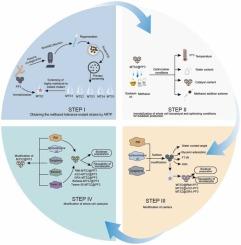当前位置:
X-MOL 学术
›
Ind. Crops Prod.
›
论文详情
Our official English website, www.x-mol.net, welcomes your
feedback! (Note: you will need to create a separate account there.)
Enhanced catalytic performance of methanol-tolerant Rhizopus stolonifera immobilized on polyurethane foam with hydrophobic coating for biodiesel production
Industrial Crops and Products ( IF 5.6 ) Pub Date : 2024-10-16 , DOI: 10.1016/j.indcrop.2024.119857
Hong Yang , Mingming Yu , Hao Shi , Fei Wang , He Liu , Xun Li
Industrial Crops and Products ( IF 5.6 ) Pub Date : 2024-10-16 , DOI: 10.1016/j.indcrop.2024.119857
Hong Yang , Mingming Yu , Hao Shi , Fei Wang , He Liu , Xun Li

|
The limited methanol tolerance and glycerol adsorption tendency of whole-cell catalysts are the main factors contributing to the extended catalytic cycle and limited catalyst reusability in biodiesel preparation. In this study, a 7.5 % methanol-tolerant Rhizopus stolonifera mutant (MTS2) was developed through the atmospheric and room temperature plasma (ARTP), exhibiting a 1.5-fold increase in methanol tolerance compared with the wild type strain (WT-RS), along with a 93.5 % increase in lipases activity. Polyurethane foam PF3 with an average pore size of 0.15 mm and 90 A rigidity is optimal for MTS2 immobilization (MTS2 @PF3), enabling its application in continuous processing for industrial applications. Utilizing soybean oil as a substrate, the catalyst MTS2 @PF3 produced 95.5 % of fatty acid methyl esters (FAME) in 36 hours under optimal conditions (30°C, 180 r/min, catalyst dosage of 15 % g/g oil, 30 % water content, and methanol addition in Scheme 3), achieving over a 50 % reduction in reaction time compared with WT-RS@PF3. To address limitations in catalyst reusability due to glycerol adsorption, various modifiers, including rosin-based modifier (RM), amino silicone oil (ASO), graphene (GRA), betaine and Tween 80 were evaluated. The glycerol adsorption rates experienced substantial reductions (39.3 % with RM and 85.6 % with betaine), and the catalysts maintained above 60 % FAME yield even after 8 reaction cycles. The combination of enhanced methanol tolerance, lipase activity, and reduced glycerol adsorption contribute to enhanced catalytic efficiency and reusability, which can reduce production costs for biodiesel manufacturing. The composite of these attributes makes MTS2 @RM1-PF3 and Betaine-MTS2 @PF3 as promising candidate for industrial biodiesel production, addressing previous limitations in catalyst performance and sustainability. The developed immobilized whole-cell catalysts exhibit promising potential for more sustainable and cost-effective processes in biodiesel manufacturing.
中文翻译:

增强固定在聚氨酯泡沫上且带有疏水涂层的耐甲醇根霉的催化性能,用于生物柴油生产
全电池催化剂的有限甲醇耐受性和甘油吸附倾向是导致生物柴油制备中催化循环延长和催化剂可重用性受限的主要因素。在本研究中,通过常压和室温等离子体 (ARTP) 开发了 7.5% 耐甲醇的匍匐根霉突变体 (MTS2),与野生型菌株 (WT-RS) 相比,甲醇耐受性提高了 1.5 倍,脂肪酶活性提高了 93.5%。聚氨酯泡沫 PF3 的平均孔径为 0.15 mm,刚度为 90 A,最适合用于 MTS2 固定化 (MTS2 @PF3),使其能够应用于工业应用的连续加工。催化剂 MTS2 以大豆油为底物,在最佳条件下(方案 3 中为 30°C,180 r/min,催化剂用量为 15 g/g 油,含水量 30 %,添加甲醇),在 36 小时内@PF3产生 95.5% 的脂肪酸甲酯 (FAME),与 WT-RS@PF3 相比,反应时间缩短了 50 % 以上。为了解决甘油吸附引起的催化剂可重用性限制,评估了各种改性剂,包括松香基改性剂 (RM)、氨基硅油 (ASO)、石墨烯 (GRA)、甜菜碱和 Tween 80。甘油吸附速率显著降低(RM 为 39.3%,甜菜碱为 85.6%),即使在 8 个反应循环后,催化剂仍保持 60% 以上的 FAME 产率。增强的甲醇耐受性、脂肪酶活性和减少甘油吸附的组合有助于提高催化效率和可重复使用性,从而降低生物柴油制造的生产成本。 这些特性的复合使 MTS2 @RM1-PF3 和甜菜碱-MTS2 @PF3成为工业生物柴油生产的有前途的候选者,解决了以前在催化剂性能和可持续性方面的限制。开发的固定化全细胞催化剂在生物柴油制造中显示出更可持续和更具成本效益的工艺的潜力。
更新日期:2024-10-16
中文翻译:

增强固定在聚氨酯泡沫上且带有疏水涂层的耐甲醇根霉的催化性能,用于生物柴油生产
全电池催化剂的有限甲醇耐受性和甘油吸附倾向是导致生物柴油制备中催化循环延长和催化剂可重用性受限的主要因素。在本研究中,通过常压和室温等离子体 (ARTP) 开发了 7.5% 耐甲醇的匍匐根霉突变体 (MTS2),与野生型菌株 (WT-RS) 相比,甲醇耐受性提高了 1.5 倍,脂肪酶活性提高了 93.5%。聚氨酯泡沫 PF3 的平均孔径为 0.15 mm,刚度为 90 A,最适合用于 MTS2 固定化 (MTS2 @PF3),使其能够应用于工业应用的连续加工。催化剂 MTS2 以大豆油为底物,在最佳条件下(方案 3 中为 30°C,180 r/min,催化剂用量为 15 g/g 油,含水量 30 %,添加甲醇),在 36 小时内@PF3产生 95.5% 的脂肪酸甲酯 (FAME),与 WT-RS@PF3 相比,反应时间缩短了 50 % 以上。为了解决甘油吸附引起的催化剂可重用性限制,评估了各种改性剂,包括松香基改性剂 (RM)、氨基硅油 (ASO)、石墨烯 (GRA)、甜菜碱和 Tween 80。甘油吸附速率显著降低(RM 为 39.3%,甜菜碱为 85.6%),即使在 8 个反应循环后,催化剂仍保持 60% 以上的 FAME 产率。增强的甲醇耐受性、脂肪酶活性和减少甘油吸附的组合有助于提高催化效率和可重复使用性,从而降低生物柴油制造的生产成本。 这些特性的复合使 MTS2 @RM1-PF3 和甜菜碱-MTS2 @PF3成为工业生物柴油生产的有前途的候选者,解决了以前在催化剂性能和可持续性方面的限制。开发的固定化全细胞催化剂在生物柴油制造中显示出更可持续和更具成本效益的工艺的潜力。







































 京公网安备 11010802027423号
京公网安备 11010802027423号